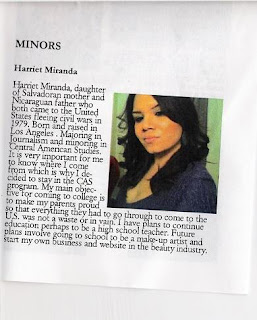 Today I got a certificate for my minor in Central American Studies. This is the only program of its kind in the whole United States. Last year was the first graduating class in CAS, This year the participants more than doubled. I think its important to know where you come from, in order to know where you're going.
Today I got a certificate for my minor in Central American Studies. This is the only program of its kind in the whole United States. Last year was the first graduating class in CAS, This year the participants more than doubled. I think its important to know where you come from, in order to know where you're going. My mom set off for the U.S. early in 1979, she'd just graduated high school that same year and just in time, El Salvador was about to errupt in one of the deadliest wars in the country's history, ending in an exodus of 1/5 of the country's population ( in a country of only 5 million) and the death of almost 100,000 people. The war lasted 12 years, resulting in absolutely nothing.
You see it's easy to point the finger and scapegoat immigrants coming from south of the border but when you take the time to notice the push and pull factors that are involved  in making such a long and dangerous journey you realize that it was that they had to leave rather than they wanted to leave their homes, families, and lives.
in making such a long and dangerous journey you realize that it was that they had to leave rather than they wanted to leave their homes, families, and lives.
 in making such a long and dangerous journey you realize that it was that they had to leave rather than they wanted to leave their homes, families, and lives.
in making such a long and dangerous journey you realize that it was that they had to leave rather than they wanted to leave their homes, families, and lives. Oh here is a map of the 7 countries that make Central America for those of you who don't know. I googled it the source is www.contourstravel.com.au
As often is the case in Latin American countries, a military regime takes power, then 90% of the wealth is locked in 10% of the population (an approximation), and the disparity between the rich and poor is so great that people have no other option than to organize and press for change.
What would you do if you couldn't own anything?
or get a decent paying job? Healthcare? and what about equal access to education? do you just sit around and wish it all away?
The fear of communism has always been prevalent...so it became easy to blame unionizing teachers, students, and farm workers for trying to "conspire" against the government labeling them a threat to national security, communists, terrorists.
It was under this guise that crimes against humanity were executed by the masses in El Salvador during the 80's. Backed by the U.S. government and the Reagan administration in an effort to stop the spread of communism, the U.S. took the whole NIMBY attitude (Not In My BackYard), & supported the Salvadoran army led by Major Roberto D'Aubuisson who formed the death squads who tortured and killed thousands of civilians . The U.N funded Truth Comission for El Salvador found that an astonishing 85% of human rights violation acts were executed by the state. What guerillas? What terrorists? It was the GOVERNMENT.
Without going into much more politics or details, it is important for people to know that things aren't always what they seem, and if a massive influx of Latino immigrants came during the 1980s and 90s it wasn't just some phenomenon of nature. Similar situations were happening in Guatemala, Nicaragua, and still are in places like Chiapas in southern Mexico.
My dad came for these same reasons. Although in Nicaragua the FSLN actually won the revolution. It was the only succesful overturn of gov't of its kind in Central America.
Anyway, I just wanted to share why I'm very specific about not being thrown into just any old category when asked about my ethnicity. I'm half Salvadoran and half Nicaraguan and damn proud of it. My mom set out to this country a teenager... with NO ONE here waiting for her. She found her way, by herself, worked her ass off, climbed the corporate ladder, and made a very comfortable life for my sisters and I.
There are people that lost their whole families in the atrocities that were funded by American dollars, by aiding the oppresive governments in Central America and by training Central American children in military tactics and "counter-insurgent" warfare at The School of the Americas aka The School of Assassins (http://www.soaw.org/), here in the U.S.
There are so many sad stories I could tell you, stories that rarely get told because people don't talk about it, its taboo in a sense because to Central American people the wounds are fresh. Some great films that depict these stories are, Innocent Voices, Under the Same Moon, and Sin Nombre (the first two are at Blockbuster the last one is brand new not yet out on dvd), all tell stories of immigrant people and their struggles. So, the next time you meet someone from another country take the time to ask them what brought them here, the stories are truly inspiring and amazing, and sometimes just tragic, but deserve to be acknowledged all the same.
Mommy this one's for you. Muah.

Wow amiga I love this blog, so true. My parents came to the U.S for the same reasons (except their wasn't a war in Mexico).They had no one waiting for them. Their dedication and hard work is one of the biggest reasons I want to be a successful Latina and as college graduate were well on our way!
ReplyDelete